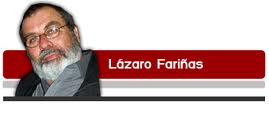“A Miami-based Cuban journalist” is the same one who, a while ago, was complaining, as usual, because in Miami they permitted for only 24 hours a billboardshowing the five spies sentenced by the United States. We should thank him in some way for teaching us that there, in “enemy” territory, at least they can engage in political criticism and disagree with the government. By contrast, in Cuba you can’t even think differently. And I congratulated him for having fled with his family to a land, if not of absolute freedom, at least of limited freedom, as he wanted to explain in his column.
And now this man once again has the nerve to say in a Cuban newspaper, “Cuba is making progress, despite the doomsayers” (29-11-2011), without specifying which way is forward, it may be the abyss, and he states that “I had a friend in Miami who was a radio commentator; heconducted interviews and made comments on that city. He defended Cuba (meaning the dictatorship) to the hilt and attacked the extreme right-wing Cuban Americans with a sarcasm and intellectual ability that few can imagine.”
I wonder if the author hadone lobe of his brainremovedso that he doesn’t mindlooking ridiculous, clumsily trying to manipulate the Cuban opinion. Or ishe just another propagandist, supposedly a journalist, since the paper supports everything they put in it. In short, he is complying with the regime and continuing to receive benefits that are granted in return for the services he provides.
Howcan this guy play with the intelligence of Cubans in such aclumsy and inconsistent way? Or is he laughing cynically about the people of Cuba? I’ll never understandhow someone who left the countryto improvehis professional and private life now defends the cause that made him flee. Because it’s impossible to be an envoy of Castro in Miami, a member of another “Wasp Network” that operates without prejudice in the media there, and thatsurvives olympically under the noses of its enemies.
The fact that someone in Miami had a radio program where he judged, criticized and ridiculed the samepeople who aresuffering deeply fromthedistance from their land, without anyone shutting downhis program, or taking revengewith their own hands, seems to me an act of stoicism on the part of those who had to endure it.
I refuse to believe that Mr. Lazarus Fariña has forgotten the fierce repression and censorship that exists in Cuba,now for over50 years, where we never were permitted to havea personal, private and independent media that would provide free speech. Not even the ability to print something, nor the right to write reviews, newspaper articles, radio spots, not to mention accessing the Internet. How canhe defend a process that punishes, with years in prison, those who voice a thought critical of Fidel Castro?
Characters like Lazarus Fariñas are thosewe sadly see in a future democratic Cuba, also defending the politicians in power.
Later he continueshis contradictory writing, wanting to protect whathe criticizes. Since criticizing censorship in order to defend the Cuban government has put him in a bind. Mr. Fariña talks nonsense by saying that this radio commentator, now deceased, named Álvaro Sánchez Cifuentes, “belonged to the revolutionary militias at the time of the Bay of Pigs invasion.” However, clearly his destiny became twisted, and he ended up living in Miami, with thosehe fought in order to avoid being forced to emigrate years later. And he survived in the city where his enemies live, thosehe provoked tirelessly, according to reports, when he asserts that”I let myself go,gave them nicknames and laughed at the stupidity of thesetragicomic characters of thelocal theater that make up the so-called Cuban exile community of Miami.”
Where Fariñas reaches new levels of cynicism is when he says “I’ve never liked participating in programs run by people who hold my own opinion. I prefer debate and discussion.” I infer that the place referred to is Cubadebate, the space of least possibility of discerningthat exists and in which the official, registered “journalists” publish, like Fariñahimself. Even more contradictory is the fact that his article is published in a country where not even a remote chance exists of challenging an official opinion, and in a newspaper where all opinions go in one direction.
Mr. Fariñas enjoys the benefits of being on both sides. He lives his “fierce” capitalism, which he doesn’t abandon, and he defends the system that doesn’t accompany it. From a short distance the story is different, and he knows it better than anyone. He survives in Miami andtakes his vacationsin Cuba. These peoplewho don’t knowthe meaning of the word”dignity” are the allies that the Cuban government deserves.
WhatI most wish for Mr. Fariñas is that his U.S. citizenship berevoked and he is returned to his Committee for the Defense of the Revolution, that they make him President of his block, and that he experience the stark reality of the Cuban people.
Then we’ll see what he says.
Translated by Regina Anavy
February 17 2012

